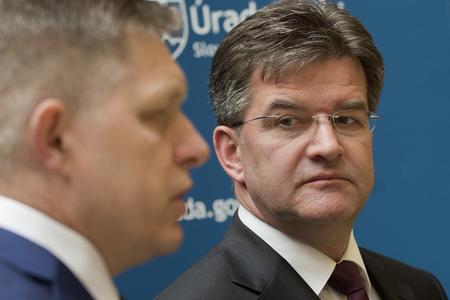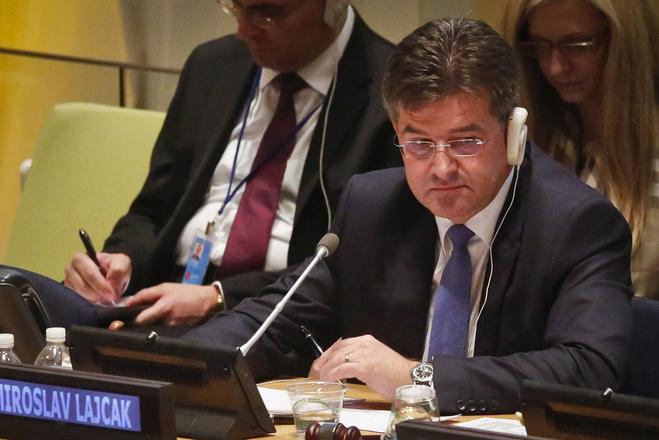The prevention of war conflicts and mediation, development, advocating human rights and international law, as well as the role of secretary general as chief administrator officer are among the priorities Slovak Foreign Affairs Minister Miroslav Lajčák wants to pursue if elected to the top UN post.
He presented them at the UN session held on June 7, while stressing the need to respect the current rules, which are primarily set by the organisation’s member states.
As he said in his opening remarks, every country represented in the UN is unique, similarly to problems in the world. There are, however, some universal principles, namely to care, to respect, to communicate, to cooperate, and to compromise, Lajčák stressed.
“My goal would be to put emphasis on how to do things better, how to use existing instruments and processes more efficiently,” Lajčák said, “how to adjust the system to get more out of it for the sake of peace and for the benefit of humankind.”
Lajčák highlighted his skills in negotiation and mediation, pointing to his experiences in Balkan countries, but also in central Europe which has “gone through tectonic changes over the past years”.
“I saw one era going to be replaced by a completely new one,” the minister said. “In some cases, the changes were smooth and peaceful, in some others they were dramatic and even tragic. But all these processes helped me to understand a lot about the world. Something the books would never do.”
The four priorities
The first and foremost priority stressed by Lajčák is conflict prevention and mediation. As he stressed, it is cheaper and more effective to prevent the conflicts than to deal with ongoing wars.
To achieve this goal, prevention must be considered a concerted action within the UN activities. The organisation has to fully engage in peace operations and the new secretary general needs to continue in strengthening the planning and operational capacities, both at the headquarters and in the field, Lajčák stressed. As for the post-conflict rehabilitation and peace-building, he stressed the need to strengthen the capacity to sustain peace and put maximum emphasis on inclusivity, cultural awareness and local needs.
“Coordination and cooperation with local and regional players is a must,” Lajčák said.
Regarding the development, Lajčák pointed to the problems with extreme poverty, hunger, and forceful departures of people from their homes.
“It’s impossible to ensure peace without addressing poverty and hunger without giving people shelter and hope,” Lajčák said, stressing the need to follow the sustainable development goals.
The minister also highlighted the role of the UN as a leading advocate for human rights and international law.
“Human rights violations are the first indicators of instability,” Lajčák said in his speech. “But they also are the first steps of depriving people of their dignity and freedom. Whenever there is such a risk, we must act and we must act resolutely.”
In order to be able to do this, it is necessary to improve the system of supervising human rights within the UN, he added.
Lajčák stressed that none of the above-mentioned goals can be achieved without a competent, functional and effective secretariat. He emphasised the need to have “a modern and active United Nations using new technologies, the one that is open to the media, engaged in regular, meaningful cooperation with regional organisations, business community, academia, civil society and NGOs”.
“A UN that is simply always a step ahead,” Lajčák added.

Responding to UN diplomats
Lajčák also called terrorism a clear threat for which countries or institutions are not prepared as they were built to prevent visible dangers.
“Terrorism is invisible, surprising,” Lajčák said, adding it is necessary to adjust in order to protect people. “It is a long-term process which needs to start with education, social inclusion. Those who do not see any chances for solid work are easy targets for extremist groups.”
Another big challenge are refugees for whom there are not any adequate measures, according to Lajčák.
He continued that the best investment is the investment into education which may help deradicalise the youth. He also stressed he does not support Islamophobia as it is part of xenophobia. He also considers it discrimination against a religion, which the UN Charter finds unacceptable.
Paradoxically, his boss in the government, PM Robert Fico, has repeatedly called Islam a foreign element in Slovakia which cannot be integrated, the Sme daily wrote.
Lajčák also answered the questions of UN diplomats who were asking him about his opinion on their local needs, like the development of Africa or environmental protection in order to save some islands from being flooded, Sme reported.
Read more about Lajčák’s vision for the UN here.



 Foreign Affairs Minister Miroslav Lajčák (source: AP/TASR)
Foreign Affairs Minister Miroslav Lajčák (source: AP/TASR)